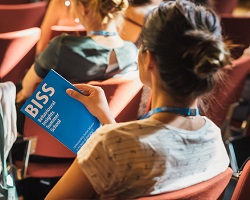Immunization professionals learn how behavioural insights can be applied to increase vaccination uptake

WHO/J. Schoeps
To help immunization professionals identify and address the reasons for less than optimal coverage, WHO held the third annual Behavioural Insights Summer School (BISS) on 26–30 August 2019, jointly organized with the University of Erfurt, Germany.
Vaccines save millions of lives every year, yet most countries are still struggling to reach all eligible children and adults with the vaccines they need. The Summer School introduces how behaviour change and behavioural insights theories can be used to understand the public’s perceptions and take them into account in tailoring their services or planning interventions. It also gives a detailed introduction to WHO’s Tailoring Immunization Programmes (TIP) approach.
Participants
BISS offers a unique opportunity for immunization programme implementers and academics to work together to understand and apply behavioural insights in the immunization field. The 2019 edition of the course was attended by:
- immunization programme managers and staff from Croatia, Denmark, Greece, Montenegro, Serbia, Turkey and Ukraine (16 participants);
- PhD students in psychology, communication science and health management from Germany, Greece, Italy, Nigeria, Serbia, Turkey, Ukraine and the United Kingdom (12 participants);
- facilitators and guest lecturers from universities, the United Nations Children’s Fund (UNICEF), the United States Centers for Disease Control and Prevention and WHO;
- WHO national programme officers working in various countries.
Continuous learning and assessment
Learning methods included extensive group work, in which participants put the concepts into practice on a fictive case study. Expected outcomes include strengthened capacity to take into account the barriers and drivers related to vaccination among key target groups and, based on this, to develop more effective and cost-effective responses to challenges related to vaccination uptake or hesitancy in the participating Member States.
Evaluation methods applied during and after the Summer School included continuous feedback and reflection, an online evaluation of learning methods, illustrated self-assessment of skills and knowledge on the first and last days of the course, and telephone interviews to be conducted 9 months after completion to evaluate the longer-term impact. A perceived increase in knowledge and skills among the participants was observed related to all of the learning objectives.



